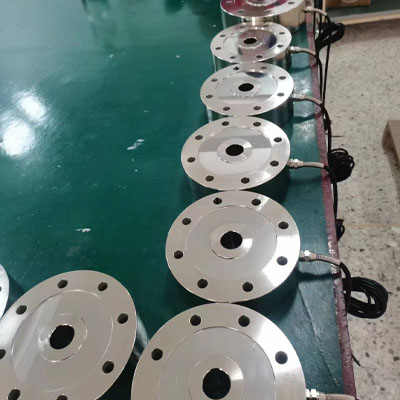
Spoke Load Cells: Key Players in Testing Machines
In the world of material testing, precise and reliable measurements are critical for achieving accurate results. Whether it's testing the tensile strength of metals, the compression resistance of concrete, or the flexibility of polymers, the load cell plays an integral role in these assessments. One type of load cell that has proven indispensable in the testing machine field is the spoke load cell. This highly versatile and reliable component is often used in various types of testing machines, providing engineers with essential data to ensure the quality and integrity of materials.
What is a Spoke Load Cell?
A spoke load cell is a type of strain gauge-based load cell that utilizes a unique, spoke-like design to measure force or load. This design consists of a central load-bearing structure (the “hub”) and multiple radial spokes that distribute the load evenly across the device. As force is applied to the load cell, the strain gauges attached to the spokes detect the strain, allowing the load cell to convert this physical deformation into an electrical signal that can be accurately measured and recorded.
The spoke load cell is renowned for its robust construction, high accuracy, and ability to handle varying loads without compromising performance. It's commonly found in industrial testing machines such as tensile testing machines, compression testers, and other systems that require precise force measurement.
Why Choose a Spoke Load Cell?
High Accuracy & Sensitivity
Spoke load cells are known for their high precision, delivering reliable measurements even with small load variations. The evenly distributed load on the radial spokes results in consistent strain readings, which translates to more accurate test results. This makes them ideal for applications where even minor changes in load could significantly impact the outcome of the test.Durability & Longevity
The design of spoke load cells provides excellent protection against mechanical wear and tear. Their robust construction allows them to withstand harsh testing environments, including high-pressure conditions, vibrations, and shock loads. This durability ensures they maintain reliable performance over extended periods, reducing the need for frequent recalibration or replacement.Compact Design
Compared to traditional load cells, spoke load cells often have a more compact design, making them suitable for use in smaller testing machines or applications with space constraints. Their ability to deliver accurate measurements in a smaller form factor makes them daptable to a range of testing scenarios.Versatility
Spoke load cells are incredibly versatile and can be used for a variety of tests, from tensile testing and compression testing to load cell calibration and material strength evaluations. Their ability to measure both static and dynamic loads makes them suitable for applications in industries such as aerospace, automotive, manufacturing, and material science.
Applications of Spoke Load Cells in Testing Machines
Tensile Testing Machines
In tensile testing, spoke load cells measure the force required to stretch materials like metals, plastics, and rubber until they break. These tests provide valuable information about the material’s strength, elongation properties, and elasticity. Spoke load cells ensure that the forces applied during the test are measured with precision, helping engineers design stronger and more resilient materials.Compression Testing Machines
Compression testing machines often utilize spoke load cells to measure the force required to compress a material, such as concrete or rubber, to assess its durability and behavior under pressure. The accurate readings from spoke load cells allow for detailed analysis of material properties, aiding in product development and quality control.Universal Testing Machines (UTMs)
Spoke load cells are often integrated into Universal Testing Machines, which can perform a wide range of tests, from tensile and compression to bending and shear. These machines require load cells with high sensitivity and robustness to ensure that all test results are accurate and reproducible. Spoke load cells meet these demands with precision.Calibration and Verification
Spoke load cells are also employed in calibration rigs and force measurement systems to validate the performance of other testing equipment. Their consistent performance makes them an excellent choice for verifying the accuracy of other load measurement systems.
How to Choose the Right Spoke Load Cell for Your Testing Needs
When selecting a spoke load cell for your testing machine, it's essential to consider the following factors:
Load Capacity: Choose a load cell with a capacity that suits the maximum expected load of your tests. Overloading a load cell can lead to inaccurate readings or damage.
Accuracy and Sensitivity: The resolution and accuracy of the load cell should match the level of precision required for your tests. Higher sensitivity is crucial for applications that demand precise measurements.
Environment Compatibility: Ensure that the load cell is suitable for the operating conditions, including temperature, humidity, and exposure to chemicals or corrosive substances.
Size and Integration: The load cell should fit seamlessly into your testing machine’s setup. Consider the dimensions, mounting options, and compatibility with existing systems.
Conclusion
Spoke load cells are a vital component in the field of testing machines, providing unmatched accuracy, durability, and versatility. Their ability to handle both static and dynamic loads, along with their compact design, makes them an excellent choice for a wide range of material testing applications. Whether you're conducting tensile, compression, or universal tests, a spoke load cell ensures that your force measurements are reliable, consistent, and accurate.
By incorporating spoke load cells into your testing machinery, you can enhance the quality and performance of your testing operations, providing better insights into material properties and helping to drive innovation across industries.






 售前客服
售前客服